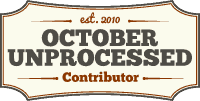
Uh oh. There I go, getting all drama-queen on you. But there’s mounting proof that GM foods are harmful to animals and humans. About 75 percent of all processed foods in this country contain some GM ingredients, so chances are you're being violated without even knowing it. GM corn fed to mice and pigs have shown organ and blood abnormalities, as well as immune dysfunction. Scientists have discovered reproductive problems in pigs and cows. And there have been mysterious deaths in chickens. According to Jeffrey Smith, author of Seeds of Deception, the most common side effects from GM crops are allergenic, toxic, carcinogenic and anti-nutritional.
How do we know what's GM when there's no GM labeling on our food? The most prevalent GM crops are corn, soy, cottonseed and canola. By definition, an organic crop cannot be genetically modified, so in addition to the big four, it’s important to buy organic zucchini, crookneck squash, Hawaiian papaya and sugar derived from sugar beets, since those are mostly GM crops.
So let's all strap on our chastity belts and join the growing non-GM movement by fighting to have all GM foods labeled and choosing only non-GM foods when possible. The Institute for Responsible Technology has compiled an excellent Non-GMO Shopping Guide that you can download for free.







Monsanto is bad
ReplyDeleteMichael Pollan told me so
Cereal rapist!
There's a haiku for you
Seed need Pollan-nation
ReplyDeleteNot big agri-vation
No mo' GMO!